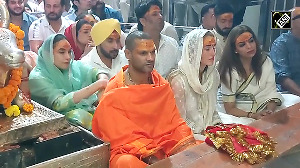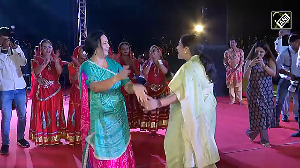Part I: A picture of hell, and no kerosene
Part II: Despatches from Tamil Nadu, 1
Part III: They are not beggars, they don't like handouts
Part IV: When time stopped on the coast
Part V: 'This will also slip from public memory'
Just listen
Time after time, at village after village, people rush up to us and start telling us of their loss. When that happens all day, it begins to get tough. But my travelling companion, Dilip D'Souza, teaches me an important lesson.
Also Read: The tsunami tragedy: Complete coverage
"These people have so much inside them," he says, "that they just want to unload. That is why they tell you their story. Some of these stories are so sad that I know that I can do nothing to help them -- except listen to what they have to say. So I listen."
Cold drink by the battered coast
You would think they were touts at a tourist place. As soon as we reach Bommaiya Palayam, a small fishing village near Pondicherry, three men, Thirumurugan, Natarajan and Sundar, rush towards us and begin speaking to us simultaneously. As we stand there bewildered they start arguing among themselves about who will "show us around." Thirumurugan seems to win, though Natarajan follows us around, and keeps butting in to contradict his fellow fisherman.
As we start, Thirumurugan asks us for money. We tell him, patiently, that we are journalists, and we have no money to give him, we just want to write about what has happened here so that more people know about it. He nods.
Bommaiya Palayam is right by the sea, and there used to be a line of huts about 30 metres from the shoreline, and then a road, and then more huts. That first line of huts has been decimated. We wouldn't know there was one there if we hadn't been told.
Thirumurugan takes us one by one to a large number of damaged huts, where people tell us what happened to them. He takes particular care to carefully enumerate everything that's been lost in each house, as if we are government surveyors.
We see some boats in a clearing that are packed with mattresses, blankets and utensils. "Whose boats are these?" we ask. "Oh, these are not our boats," Thirumurugan says. "Our boats were all washed away. These came in with the waves. All our boats are gone. Please write that down."
Somehow I don't find Thirumurugan to be particularly credible, so as Dilip sticks with him, I walk around on my own. I start a conversation with a gentleman named Kumar.
"I was in Dubai for seven years," he tells me. "I saved some money there and came back here, but now it's all gone. Boat is gone, house is gone, everything is gone." Men like Kumar often don't keep their savings in a bank -- he just had some gold at home, and that was taken by the sea.
"Have you received any relief so far," I ask him.
"Government came and gave 4,000 [rupees] to each of the affected people," he said. "They also said that they will give boat later. Let us see."
They have, however, received aid from Auroville, in nearby Pondicherry, [people] who came everyday and fed these people. "If not for Auroville," he says, "we would have died."
Auroville rallies to help Pondicherry fisherfolk
Dilip now approaches me with Thirumurugan in tow, who asks him, again, for money. We start heading back towards the road. Then Kumar runs up to me from behind and touches my shoulder.
"Would you like some cold drinks?" he asks. We say no. We shake his hand, wish him luck, and then we're on our way again.
The receding waves
"We could see two kilometres into the sea," Kumar tells us in Bommaiya Palayam. His hut, which was washed away, was right by the sea. He says that it wasn't swept away when the waves came in, but when they receded, furiously sweeping away houses, boats, trees and people with them. They receded so fast, as if something at the heart of the ocean was sucking it away, that the villagers could see land for two kilometres beyond the coastline.
"And what of everything that was swept away," I ask.
"Oh, we found a lot of it on Auro Beach," he says. Auro Beach, we gather, is a couple of kilometres from here.
In most of the places that we have travelled to in Tamil Nadu, people tell us that it is the receding waves that have done the greatest damage. There is plenty of visual evidence of this. In Silver Beach, Devanapattinam, just outside Cuddalore city, we noticed that all the structures that were still standing were leaning conspicuously towards the sea, indicating the powerful force that uprooted them was on its way back towards the ocean.
There was a large circular water fountain that looked as if it had dropped a tap towards the sea and was just bending to pick it up. There was a large platform that looked as if it was leaning over and scanning the horizon for the statue that had, till December 26, been on it.
There were also roofs without a house lying on the beach, small pyramid-shaped roofs by themselves. We never did see the houses they were from, though we presumed they must be somewhere further inland, exposed to the sun.
Things are better at Nagapattinam
On my return to Chennai, I go straight to the
AID India office, where I run into Priya Ramasubban, a volunteer from Bangalore whom I had helped, rather ineptly, sort and pack cartons of medicine before I left Chennai on my journey through Tamil Nadu. Priya has just returned with a team of AID volunteers from Nagapattinam, where she says things are much better than when I was there last. The teams disposing of bodies finally did get their kerosene, and the government has just stepped in there to take over body disposal. And they have, finally, got earth-moving trucks with them."I have heard that they have been given a deadline to dispose of dead bodies," she says, which, if true, means that someone higher up in the administration has finally got his/her act together. Let's hope the government stays as committed through the process of long-term rehabilitation.
Amit Varma is travelling around the disaster-affected areas in Tamil Nadu, and is writing on his experiences in his blog,
India Uncut. These despatches have been adapted from there.




